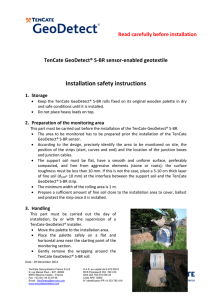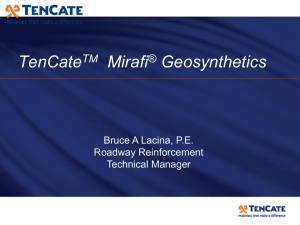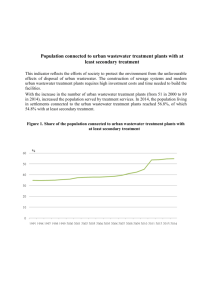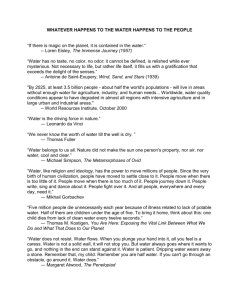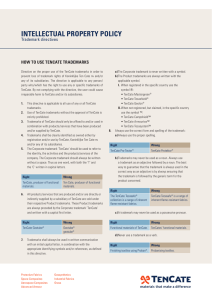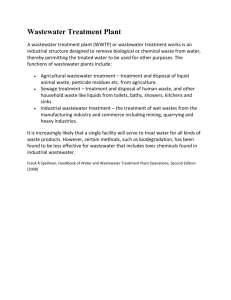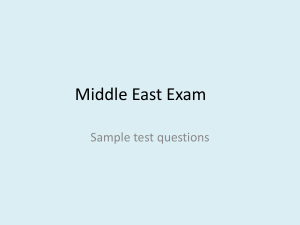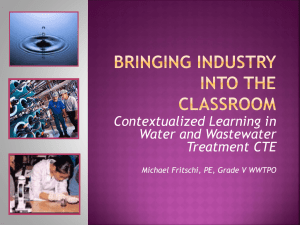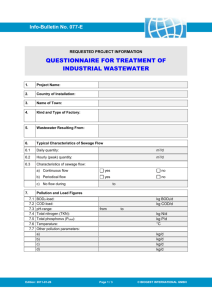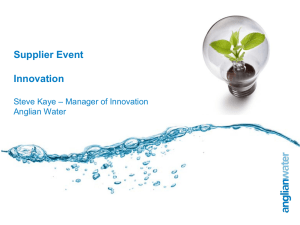Water
advertisement
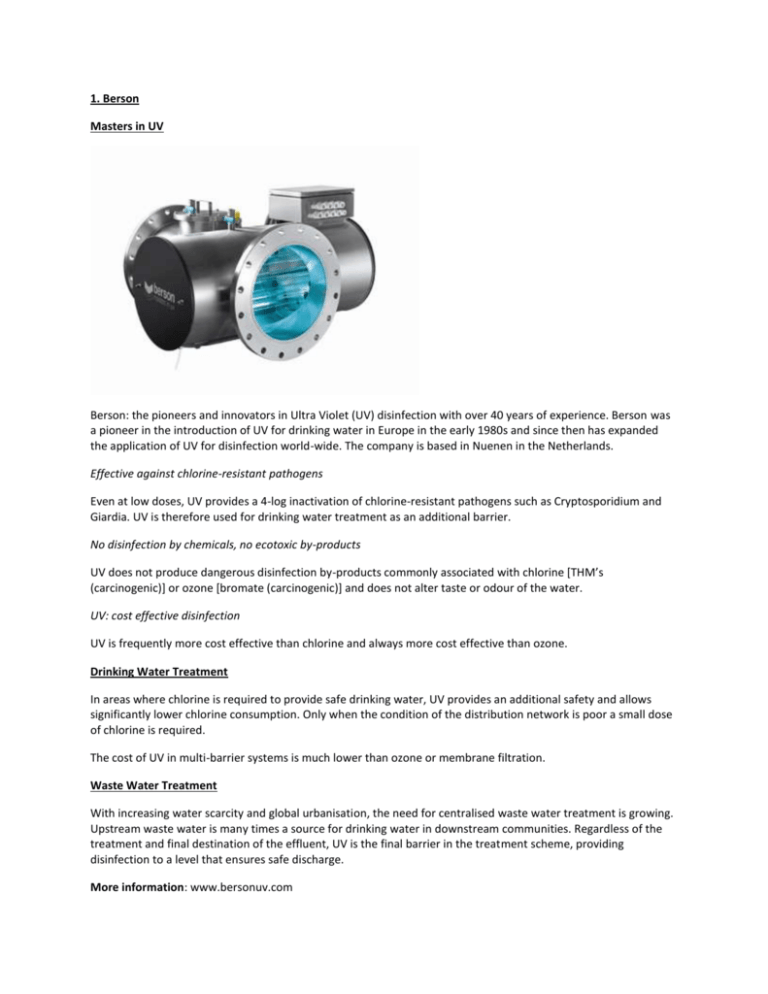
1. Berson Masters in UV Berson: the pioneers and innovators in Ultra Violet (UV) disinfection with over 40 years of experience. Berson was a pioneer in the introduction of UV for drinking water in Europe in the early 1980s and since then has expanded the application of UV for disinfection world-wide. The company is based in Nuenen in the Netherlands. Effective against chlorine-resistant pathogens Even at low doses, UV provides a 4-log inactivation of chlorine-resistant pathogens such as Cryptosporidium and Giardia. UV is therefore used for drinking water treatment as an additional barrier. No disinfection by chemicals, no ecotoxic by-products UV does not produce dangerous disinfection by-products commonly associated with chlorine [THM’s (carcinogenic)] or ozone [bromate (carcinogenic)] and does not alter taste or odour of the water. UV: cost effective disinfection UV is frequently more cost effective than chlorine and always more cost effective than ozone. Drinking Water Treatment In areas where chlorine is required to provide safe drinking water, UV provides an additional safety and allows significantly lower chlorine consumption. Only when the condition of the distribution network is poor a small dose of chlorine is required. The cost of UV in multi-barrier systems is much lower than ozone or membrane filtration. Waste Water Treatment With increasing water scarcity and global urbanisation, the need for centralised waste water treatment is growing. Upstream waste water is many times a source for drinking water in downstream communities. Regardless of the treatment and final destination of the effluent, UV is the final barrier in the treatment scheme, providing disinfection to a level that ensures safe discharge. More information: www.bersonuv.com 2. Deltares – The Netherlands Deltares is a leading independent institute for applied research in the field of water, subsurface and infrastructure. Throughout the world, we work on smart solutions, innovations and applications for people, environment and society. Our main focus is on deltas, coastal regions and river basins. Managing these densely populated and vulnerable areas is complex, which is why we work closely with governments, businesses, other research institutes and universities at home and abroad. Our motto is Enabling Delta Life. As an applied research institute, the success of Deltares can be measured in the extent to which our expert knowledge can be used in and for society. For Deltares the quality of our expertise and advice is foremost. Knowledge is our core business. All contracts and projects, whether financed privately or from strategic research budgets, contribute to the consolidation of our knowledge base. Furthermore, we believe in openness and transparency, as is evident from the free availability of a selection of our software and models. Open source works, is our firm conviction. Deltares employs over 800 people and is based in Delft and Utrecht. Strategy: In supporting public authorities, private parties and society, Deltares acts as: • Research and development centre • Knowledge broker • Knowledge and information centre • Specialist advisor In 2008, Delft Hydraulics (founded in 1927) fully merged into Deltares, together with GeoDelft, the Soil and Groundwater department of TNO and research departments of the Dutch Department of Public Works, Transport and Water Management. • Assessor and analyst. More information: www.deltares.nl 3. Dienst Landelijk Gebied (DLG), Government Service for Land and Water For sustainable land and water management The DLG Service for Land and Water Management is evolving into an independent executive Agency of the Ministry of Agriculture, Nature Management, and Fisheries. Its main tasks are: To plan, prepare and implement rural development projects in the Netherlands To contribute with advisory services to the Central Government in order to develop rural development policies To procure, manage and sell land as a tool for structural improvement of agriculture, the realisation of nature and recreational area's, landscape building and infra-structural facilities. To arrange land management agreements with farmers in order to stabilise or improve environmental conditions of the areas involved; To achieve multi-sectoral regional development plans through an intensive community participation and institutional strengthening development using its own typical approach. The Service has been active in the Netherlands for a period of more than sixty years. During the past twenty years, it is involved more intensively in transferring its unique experience and skills abroad. DLG's organisation consists of a head-office in Utrecht, where management, administration, application-oriented research, specific technical skills and the international department are concentrated. In addition there are 11 provincial offices, which are mainly in charge of the implementation of rural development projects. To its special skills and experience the Service adds its own typical style, which can be characterised by the key terms “project based integral rural development”, “institutional strengthening” and “participatory approach”. The involvement of the DLG Service for Land and Water Management in countries abroad has an emphasis on assisting governmental institutions in partner countries. Regularly, the Service acts as impartial advisor to these institutions in development co-operation projects on matters related to land and water use planning and management. Given its status as an impartial government agency, DLG is in a position to guide the interested parties in a designed project area through the complicated planning and implementation process of rural development. DLG’s broad experience in translating government rural development policies to practical rural development measures on a regional level, by activating and/or strengthening local institutions, is definitely one of its more important assets. More information: www.dlg.nl 4. Hydrologic Innovation in water management Climate change presents new challenges to water managers who have to deal more often with floods, calamities, periods of droughts and water scarcity. The context in which water problems have to be solved is becoming more complex. Therefore HydroLogic provides innovative hydroinformatics solutions to water authorities with which they can manage water systems effectively and which enables them to communicate clearly with stakeholders. Key to our innovative approach in projects is a smart combination of: In-depth knowledge of urban and rural water management. Application of sophisticated ICT. Special attention to communication and collaboration with stakeholders. With this approach we support our clients in finding and implementing sustainable solutions for important water problems in the Netherlands and abroad. Our clients are: municipalities, environmental authorities, water boards, ministries and the European Commission. We work from two offices in the Netherlands: Amersfoort and Delft. In the Amersfoort office we focus on product development and consultancy, and in Delft we focus on research. Internationally we are specifically active in the following water themes: Water safety: risk analysis on the basis of high resolution modelling of fluvial and pluvial floods: 1D/2D simulation of inundation, dike and dam breaches. Urban water management: drainage modelling and wastewater modelling including coupled models. Regional water management: integral water-system analysis and waterinfrastructure studies. Water supply and distribution management: modelling and performance indicators for leakage detection and optimisation. Hydro-meteorology: provision of high quality meteorological information and online analysis tools (www.hydronet.com). Decision support systems: real-time probabilistic forecasting of high water and floods; warning and interactive flood control analysis using GIS-based interfaces. Information management: consultancy for gathering, structuring, elaboration and management of data and development of web-based information systems. HydroLogic was founded in 2000 and currently counts 35 enthusiastic water and ICT professionals. Our teams mainly consist of MSc and PhD academics and engineers with backgrounds in hydrology, geography, civil engineering and informatics. Our highly motivated staff is available for performing challenging hydroinformatics projects. We work independently and are also open to cooperation with other organisations. We frequently team-up with colleague consultancy, engineering and research organisations. More information www.hydrologic.com 5. Royal Haskoning DHV Royal Haskoning DHV is a leading independent, international engineering consultancy service and technology provider. Ranking globally in the top 10 of independently owned, non-listed companies and top 40 overall, its 7,000 professionals offer state of the art sustainable solutions across the globe from 100 offices in 35 countries. Our professionals deliver their services in the fields of asset management, aviation, buildings, energy, industry, infrastructure, maritime, mining, strategy, transport, urban and rural planning, water management and water technology. Our network of businesses and alliances is driven by our shared mission, values, and projects, all directed at creating innovative concepts and solutions for enhancing societies and the sustainable development of our living environment. Nereda® is the most modern biological wastewater treatment technology, that purifies water using the unique features of ‘aerobic granular biomass’. Nereda® provides excellent water quality through compact (up to 75% footprint saving) and easy to operate installations, at low energy consumption (up to 50-60% energy saving). The technology is cost-effective and is applied in new and upgrades of municipal and industrial wastewater treatment facilities. Contactpersoon: Andreas Giesen, Andreas.Giesen@RHDHV.com, Nereda@RHDHV.com, +31 88 348 2497, P.O. Box 1132, 3800 BC Amersfoort, The Netherlands More information: www.royalhaskoningdhv.com 6. Royal Ten Cate (TenCate) Royal Ten Cate (TenCate) strives for leadership in growing market niches for specialist, functional materials. The company uses its broad technological base, the specialist skills available within the organization and its strong position in the value chain. In markets which require a high degree of functionality TenCate seeks to offer highgrade solutions. The objective is to contribute to progress in the sectors in which TenCate operates. The added value for its customers results in higher valuation of the materials and profitable growth for the company. This also creates value for shareholders. TenCate Geosynthetics business unit Water & Environement TenCate Geotube® dewatering technology has become the dewatering method of choice for organizations around the world. TenCate Geotube® dewatering technology is used for projects large and small, and there is good reason -- simplicity and low cost. There are no belts, gears, or complicated mechanics. TenCate Geotube ® containers are constructed of highstrength, permeable, specially engineered textiles designed for containment and dewatering of high moisture content sludge and sediment. They are available in a variety of sizes, depending on your volume and space requirements. TenCate Geotube® systems can even be mounted in mobile roll-off containers that can be transported around your property as necessary. It's one of the most versatile dewatering technologies available. And one of the most effective. Volume reduction can be as much as 90%, with high solid levels that make removal and disposal easy. Our dewatering technology also allows for profitable recovery of valuable solids. TenCate Geotube® geocontainment technology is used as an integral component in the design and construction of a variety of marine and hydraulic engineering structures such as breakwaters, levies, and marine spoil-containment structures. Once in place, our technology provides years of continued performance. For more than 40 years, TenCate Geotube® technology has protected shorelines, rebuilt beaches, and reclaimed land from the sea. TenCate Geotube® containment technology is a proven, cost-effective method for a variety of shoreline protection and marine construction projects. TenCate Geotube® technology has been used to produce sand dune cores; wetlands and other habitats; jetties, dikes, and groynes; and underwater structures -- and to even raise brand new islands from under water. TenCate GeoDetect® monitoring technology; a revolutionary combination of geotextile performance and fiber optic sensing technology to provide actionable information related to soil strain and temperature changes of geostructures like dikes and dams. More information: www.tencate.com 7. Van Dijk Water Management B.V. General Van Dijk Water Management B.V. started in 2007 as an independent consultancy company, active in the field of water and environmental governance and management. Mrs. Joke van Dijk (BSc) is the CEO and so the ‘face’ of the company. She has a wide experience in the environmental field, gathered with working on the side of national and local governments and private companies. A speciality of the company is her knowledge of water (quality) management and water governance. We work together with different other (Dutch, European) companies or consultants. We are well informed about the European legislation framework, being also of interest for trans boundary countries and other countries outside Europe. To illustrate our expertise we often lecture at international conferences. Mrs. Joke van Dijk is a very pleasant person, she has an open and result minded approach, willing to understand your problems and able to work with people with different cultural backgrounds. Water European and national legislation Examples of important European Directives are the Water Management Act, the Water Framework Directive and the Surface Water Pollution Act. We have clear understanding of these Directives and know how to implement them in a practical way. This can be done on national (governmental) level or on regional or industrial level. At the moment we are active in implementation of the cost recovery principle, as mentioned in art. 9 of the WFD. Institutional development, governance Institutional development aims at improvement of the capabilities of the authorities involved in water resources at the national, provincial or local level or said in a different way: implementation of good water governance. We use instruments like auditing, expert group meetings, assessment of water legislation, policies, strategies and plans to improve your plandocheck-act cycle with the goal of sustainable governance. Waste water and water quality management Assessment of wastewater producing industries takes place by modelling the quantity and quality of discharged wastewater. We do this by studying the production processes or by sampling and analysing to get a representative answer. Advice is given about the possible reduction techniques of the pollutants and necessary monitoring of the wastewater. We are involved in risk based planning, implementation and training of financial systems, like the wastewater levy system. Assessment of the water quality situation is the first step. Effects on surface water and groundwater are assessed in terms of various water quality parameters. The assessments lead to insight into the cause-effect relationships, and form the basis for water quality restoration strategies and concrete action programs. More information: www.jvdijk-water-management.eu 8. Witteveen+Bos The company Witteveen+Bos is a Dutch engineering and independent consultancy firm, founded in 1946, that provides international services for water, infrastructure, spatial development, the environment and construction. With approximately 950 employees, we focus principally on complex projects that require high-quality knowledge and an integral approach. Witteveen+Bos offer its clients valued-added consultancy and design services. We deliver reliable solutions built on knowledge, experience, intellect and social insight. Professionalism, respect and integrity are core values. Field of work Witteveen+Bos focuses on complex and multidisciplinary issues. We solve them by deploying integral project teams that bring together experts from an array of different disciplines. We provide a broad spectrum of advice on everything from sewage stations and WWTP’s to hydraulic structures, from flood defences to mobility and from area development to climate, energy and sustainability. Organisation We have seven offices in the Netherlands and maintain international offices in Belgium, Indonesia, Kazakhstan, Latvia, Russia, Ghana and Vietnam as well as numerous project offices worldwide. Clients As a completely independent private company, Witteveen+Bos serves clients in both the public and private sectors. Our clients include multilateral and bilateral donors, ministries, provincial and local governments, industrial and commercial companies, contractors, project developers and research institutes. In line with our commitment to work closely together with our clients, projects are undertaken from our offices nearby our clients or even within a client’s own organisation. Cooperation We actively co-operate with local consultants in the countries where we work. We recognise the complimentary knowledge of local and international firms as well as the importance of exchange of know-how, and thus create added value. We also operate as sub-consultant to local consultants to assist them in a particular field of expertise. Witteveen+Bos maintains a solid track-record of successfully completed projects in the Balkan region. Some recent project examples include: - Croatia: Wastewater feasibility studies in Istria and Dalmatia; development of institutional options for the Croatian water sector, port of Vukovar, rehabilitation of the Sava river waterway; Albania: environmental Hot Spots, Design of LPG and oil jetty in the port of Durrës; feasibility study on the treatment of communal wastewater. Montenegro: study on the quality and potential of various ports; Serbia: River Basin Management plan for inland waterways transport, general Transport Masterplan; waste water masterplan Southern Morava region, remediation of hotspots, engineering of navigation locks at Djerdap I and II, river training and dredging works for selected locations along the Danube in Serbia; preparation of tender documentation. More information: www.witteveenbos.nl 9. PB Techniek Company PB Techniek is specializes in fertigation and irrigation systems for fruit cultivation and horticulture. The company has been active throughout the whole world over 25 years. PB Techniek has completed leading projects in Romania, Ukraine, Slovenia, USA, Australia, Mexico, Canada etc. PB Techniek is internationally appreciated for its high level of knowledge and specialized advice on fertilizers for fruitgrowing. PB Techniek is strong in developing new techniques and applications and closely collaborates with renowned research institutes at home and abroad. Fertigation systems PB Techniek fertigation systems are advanced systems consisting of a pump, a fertilizer unit and a system of main pipes and driplines. Fertigation is an excellent combination of sparing drip irrigation and specific fertilizing for deciduous fruit as well as soft fruit. A fertigation system enables the application rate of fertilizer to be optimally dosed. These fertigation system increases production and saves water consumption and fertilizer. With the PB fertigation systems you can accurately adjust the dose of your fertilizer to suit the leaf-analysis, soil and water samples. This approach will automatically lead to optimal fertilizing of your orchards, fields and greenhouses. driplines and drippers PB Techniek supplies the latest types of in line drippers and button drippers drip emitters. PB Techniek offers a choice between pressure-compensating and non-pressure-compensating drippers. The advantage of the pressurecompensating drippers is that there is always a constant water supply at a pressure of between 1.5 and 4.0 bar. These pressure-compensating drippers are, for example, highly suitable for extremely sloping plots of land or if extremely long pipes are used where a loss of pressure can occur. The PB range offers the ideal dripper for every application. PB Techniek is a proven supplier of high quality & innovative systems. The fertigation units are developed and built in our company and custom made. The systems can be supplied turnkey: including software, the units, the hoses & drippers etc. Though modular supply is also possible The units can fertigate any size of land, from small up to very large More information: www.pb-techniek.nl 10. Dacom – Leading in Agri Yield Management Dacom is an innovative high-tech company that develops and supplies Agri Yield Management systems to arable farms, food processing companies and suppliers around the world. The Dacom system offers practical solutions for profitable and sustainable agriculture. By combining sensor technology, internet and scientific knowledge, the production process can continuously be monitored and fine-tuned throughout the growing season. The Dacom system assists and advises in areas including disease control, irrigation, insect control, fertilisation and effectiveness of the fungicides used. More information: www.dacom.nl
